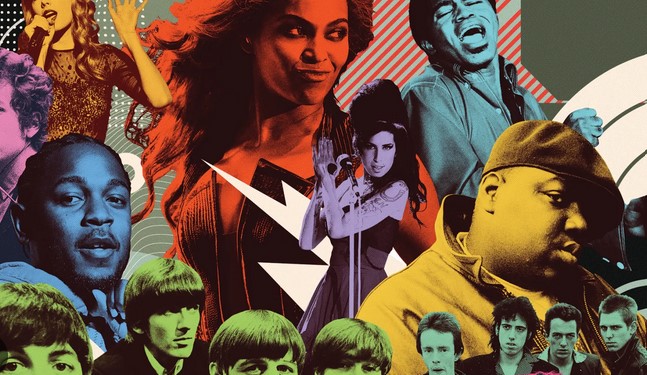Famous music albums have had a profound impact on the industry, shaping culture and influencing generations of listeners. These albums not only introduced new sounds but also defined eras, sparked social movements, and elevated music to an art form. In this post, we explore several iconic albums that changed history, their lasting influence, and the revolutionary shifts they caused in music.
The Beatles – Sgt. Pepper’s Lonely Hearts Club Band (1967)
One of the most famous albums in history, Sgt. Pepper’s Lonely Hearts Club Band by The Beatles, transformed music forever. Released in 1967, this album pushed the boundaries of popular music by incorporating a wide range of musical styles, from rock to orchestral arrangements. It was one of the first albums to be considered a complete artistic statement, not just a collection of songs. With experimental sounds and innovative studio techniques, Sgt. Pepper’s became a cultural phenomenon. The album also reflected the counterculture movement of the 1960s, promoting ideals of peace, love, and freedom. The Beatles’ willingness to experiment with new sounds inspired countless artists and helped elevate the idea of the album as an artistic statement rather than just a commercial product.
Michael Jackson – Thriller (1982)
Michael Jackson’s Thriller is another famous album that changed history. Released in 1982, it became the best-selling album of all time, breaking numerous records and defining the 1980s music scene. Thriller blended pop, rock, and R&B, creating a sound that was universally appealing. The album also introduced groundbreaking music videos, including the legendary “Thriller” video, which revolutionized the concept of music videos as a key part of an artist’s image. Jackson’s incredible talent and ability to fuse genres made Thriller a global phenomenon, transcending cultural and racial boundaries. It set a new standard for pop music and is still considered one of the greatest albums of all time.
Nirvana – Nevermind (1991)
Nirvana’s Nevermind, released in 1991, marked the beginning of the grunge era and brought alternative rock into the mainstream. With songs like “Smells Like Teen Spirit,” Nevermind captured the disillusionment and angst of Generation X. The album’s raw, unpolished sound contrasted sharply with the highly produced pop and rock music of the 1980s. Kurt Cobain’s heartfelt lyrics and the band’s explosive energy resonated deeply with young listeners, making Nevermind a defining album of the 1990s. The album’s success also paved the way for other alternative bands, influencing the direction of rock music for years to come. Nirvana’s impact on music is still felt today, as the album helped establish grunge as a cultural and musical movement.

Beyoncé – Lemonade (2016)
Beyoncé’s Lemonade, released in 2016, is another famous album that changed history. It was more than just a musical project—it was a cultural event. Lemonade combined elements of pop, rock, R&B, and country, while also telling a deeply personal and political story. The album addressed issues of infidelity, empowerment, and race, while also exploring themes of healing and reconciliation. With Lemonade, Beyoncé took artistic control to new heights, offering a visual album that paired each song with a powerful short film. The album was a game-changer in the music industry, showcasing Beyoncé’s ability to blend personal storytelling with bold political statements. Its release also marked a turning point in the way music was consumed, as she dropped the album without prior promotion, embracing a new era of surprise releases and digital media.
Pink Floyd – The Dark Side of the Moon (1973)
Pink Floyd’s The Dark Side of the Moon is widely regarded as one of the most influential albums in the history of rock music. Released in 1973, the album explored complex themes such as mental illness, mortality, and the human experience. What set The Dark Side of the Moon apart was its innovative use of studio technology, including multi-tracked recordings, synthesizers, and sound effects. The album’s seamless integration of music and concept transformed the way albums were viewed, establishing the idea of the “concept album.” It also introduced a new approach to sound and production, which influenced not only progressive rock but a wide range of musical genres. The album’s lasting legacy can still be heard in music today, and its continued popularity speaks to its timeless appeal.
Conclusion
Famous music albums have played a key role in changing the course of music history. Whether it’s through innovative sounds, impactful messages, or cultural shifts, these albums have shaped the way we listen to and understand music. Sgt. Pepper’s Lonely Hearts Club Band, Thriller, Nevermind, Lemonade, and The Dark Side of the Moon are just a few examples of albums that pushed boundaries and changed the music landscape forever. Their influence continues to inspire artists and listeners alike, proving the lasting power of music to shape history.










